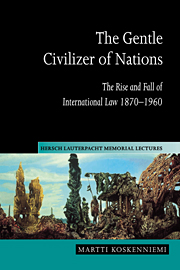Book contents
- Frontmatter
- Contents
- Preface
- List of abbreviations
- Introduction
- 1 “The legal conscience of the civilized world”
- 2 Sovereignty: a gift of civilization: international lawyers and imperialism, 1870–1914
- 3 International law as philosophy: Germany 1871–1933
- 4 International law as sociology: French “solidarism” 1871–1950
- 5 Lauterpacht: the Victorian tradition in international law
- 6 Out of Europe: Carl Schmitt, Hans Morgenthau, and the turn to “international relations”
- Epilogue
- Bibliography
- Index
3 - International law as philosophy: Germany 1871–1933
Published online by Cambridge University Press: 06 July 2009
- Frontmatter
- Contents
- Preface
- List of abbreviations
- Introduction
- 1 “The legal conscience of the civilized world”
- 2 Sovereignty: a gift of civilization: international lawyers and imperialism, 1870–1914
- 3 International law as philosophy: Germany 1871–1933
- 4 International law as sociology: French “solidarism” 1871–1950
- 5 Lauterpacht: the Victorian tradition in international law
- 6 Out of Europe: Carl Schmitt, Hans Morgenthau, and the turn to “international relations”
- Epilogue
- Bibliography
- Index
Summary
“[T]he victorious war is the social ideal: the victorious war is the ultimate means for every highest objective. In war the State demonstrates its real being, it is the fullest proof of the special quality of the State … In the victorious war legal thought sets the ultimate norm which decides which State has Right on its side … Who can, may also.” These are certainly among the most frequently quoted sentences from Erich Kaufmann's (1880–1972) 1911 book Das Wesen des Völkerrechts und die Clausula rebus sic stantibus which expounded a theory of the total State as Europe's historical and spiritual reality. For Kaufmann, a conservative legal theorist and a practitioner – including being a legal adviser at the foreign ministry of the Federal Republic in the 1950s – and a member of the Institut de droit international, the view of international law as superior to the State emerged from an unhistorical moral nihilism. Because the State – and not the shallow and discontinuous realm of the cosmopolitan – was the concrete enfolding of human spirituality, international law could never aspire to a normativity higher than the State. Useful as a mechanism of co-ordination, international law possessed no intrinsic value, represented no world-historical process of enlightenment or transcendence. No social ideal was embedded in it.
- Type
- Chapter
- Information
- The Gentle Civilizer of NationsThe Rise and Fall of International Law 1870–1960, pp. 179 - 265Publisher: Cambridge University PressPrint publication year: 2001

